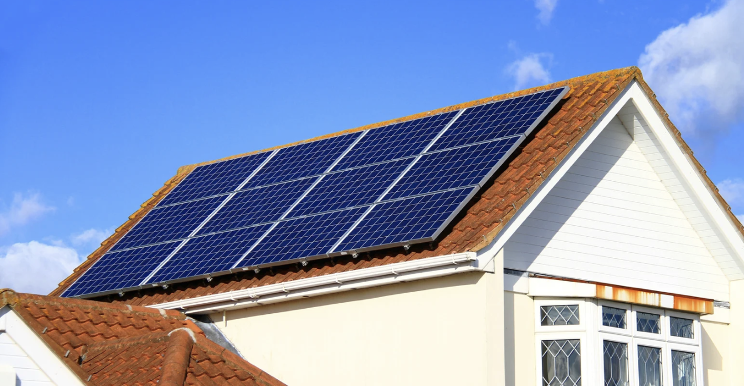As more homeowners embrace renewable energy, solar panels have become an increasingly popular choice. Not only do they offer significant savings on energy bills, but they also contribute to a more sustainable future. However, before you decide to install solar panels, it’s essential to ensure your roof is prepared for the task. At Furber Roofing, we understand the importance of getting it right from the start.
Assessing the Condition of Your Roof
Before installing solar panels, the first step is to evaluate the current condition of your roof. Solar panels are a long-term investment, and it’s crucial that your roof is in good shape to support them. A roof that’s nearing the end of its lifespan, or one that’s already showing signs of wear and tear, may not be able to handle the additional weight and could lead to costly repairs down the line.
At Furber Roofing, we recommend that your roof should have at least 10-15 years of life left before installing solar panels. If your roof is older, it may be wise to consider a replacement or significant repairs before moving forward with the installation. Investing in a roof inspection by a professional roofing contractor can help identify any underlying issues that might not be immediately visible.
Understanding the Roof Structure
The structural integrity of your roof is another critical factor to consider. Solar panels add significant weight to your roof, and it’s essential that the roof structure can support this additional load. The weight of solar panels typically ranges between 2-4 pounds per square foot, but this can vary depending on the type of panels and mounting system used.
A professional roofing contractor can assess whether your roof’s structure is strong enough to handle the extra weight. This includes checking the condition of the rafters, trusses, and decking to ensure they are in good condition. If any weaknesses are identified, it may be necessary to reinforce the structure before proceeding with the installation.
Checking for Roof Compatibility
Not all roofing materials are equally suited for installing solar panels. The compatibility of your roof with solar panels depends on the type of roofing material, the roof’s pitch, and its overall design.
- Asphalt Shingles: Asphalt shingles are one of the most common roofing materials and are generally well-suited for solar panel installation. They provide a stable surface for mounting systems and are relatively easy to work with.
- Tile Roofs: Tile roofs, including clay and concrete tiles, are more challenging to work with due to their fragility. Special care must be taken during installation to avoid breaking the tiles, and sometimes, additional mounting hardware may be required.
- Metal Roofs: Metal roofs are also a good option for solar panels, especially standing seam metal roofs, which allow for easy attachment of panels without penetrating the roof surface. This reduces the risk of leaks.
- Flat Roofs: Flat roofs can accommodate solar panels, but the installation process is different. Panels may need to be installed at an angle to maximise energy production, and ballast systems might be used to avoid penetrating the roof.
At Furber Roofing, we have experience working with various roofing materials and can advise you on the best approach based on your specific roof type.
Ensuring Proper Roof Orientation and Angle
The orientation and angle of your roof play a significant role in the efficiency of your solar panels. Ideally, solar panels should face south to capture the maximum amount of sunlight throughout the day. However, east or west-facing roofs can also be effective, depending on your location and energy needs.
The pitch of your roof is another consideration. In the UK, the optimal angle for solar panels is typically between 30 and 40 degrees. If your roof’s pitch is too steep or too shallow, it may affect the efficiency of your solar energy system. In some cases, adjustments can be made to the mounting system to optimise the angle of the panels.
Addressing Roof Repairs Before Installation
If your roof requires repairs, it’s essential to address these issues before installing solar panels. Common problems like leaks, damaged shingles, or weakened decking can be exacerbated by the installation process or by the additional weight of the panels. Fixing these issues in advance will help ensure the longevity and effectiveness of both your roof and your solar panels.
At Furber Roofing, we provide a thorough inspection and repair service to ensure your roof is in top condition before any solar installation. This proactive approach can prevent costly problems in the future and give you peace of mind knowing your investment is protected.
Planning for Long-Term Maintenance
Once your you have completed installing solar panels, it’s important to plan for long-term maintenance. While solar panels require minimal upkeep, the roof beneath them still needs regular inspections to ensure it remains in good condition. Scheduling periodic roof inspections and cleaning around the panels can help prevent debris buildup and ensure that any potential issues are caught early.
We recommend working with a roofing contractor who understands the unique needs of solar-integrated roofs. At Furber Roofing, we offer maintenance services tailored to roofs with solar panels, helping to extend the life of both your roof and your solar energy system.
Installing solar panels is a significant investment that can provide substantial long-term benefits. However, ensuring that your roof is properly prepared is essential to protect your investment and maximise the efficiency of your solar panels. By following this comprehensive checklist, you can take the necessary steps to ensure your roof is ready for solar panel installation.
At Furber Roofing, we are committed to providing high-quality roofing services that support your transition to renewable energy. Whether you need a roof inspection, repairs, or a full roof replacement, our team is here to help you every step of the way. Click here to view our solar panel page and schedule a consultation and take the first step towards a more sustainable future.

